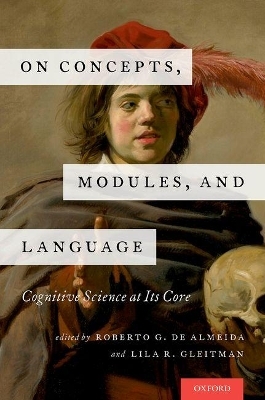
On Concepts, Modules, and Language
Oxford University Press Inc (Verlag)
978-0-19-046478-3 (ISBN)
What are the landmarks of the cognitive revolution? What are the core topics of modern cognitive science? Where is cognitive science heading? These and other questions are addressed in this volume by leading cognitive scientists as they examine the work of one of cognitive science's most influential and polemical figures: Jerry Fodor. Contributions by Noam Chomsky, Tom Bever, Merrill Garrett, Massimo Piattelli-Palmarini, Zenon Pylyshyn, Janet Fodor, C. Randy Gallistel, Ernie Lepore, Mary C. Potter, Lila R. Gleitman, and others, put in perspective Fodor's contribution to cognitive science by focusing on three main themes: the nature of concepts, the modularity of language and vision, and the language of thought. On Modules, Concepts, and Language: Cognitive Science at Its Core is a one-of-a-kind series of essays on cognitive science and on Fodor.
In this volume, Chomsky contrasts, for the first time, his view of modularity with that of Fodor's; Bever--one of the pioneers of modern psycholinguistics--discusses the nature of consciousness in particular with respect to language perception; Garrett--another of the pioneers of psycholinguistics--reassesses his view of modularity in language production; Pylyshyn--one of the leading figures of the modern symbolic, computational view of the mind--presents his view of the connection between visual perception and conceptual attainment; Gallistel--one of the most prominent cognitive neuroscientists--presents a proposal on what the biological bases of the computational theory of mind might be. Massimo Piattelli-Palmarini discusses Fodor's views on conceptual nativism, stemming from the epic debate between Chomsky and Piaget, which Piattelli-Palmarini organized. These and many other key figures of cognitive science are brought together, for the first time, constituting the most up-to-date critical view of some of cognitive science's most polemical topics and its prospects as the science of the mind. This volume is aimed at students and advanced researchers in core areas of cognitive science and is bound to become one of the classics in the field.
Roberto G. de Almeida is an Associate Professor of Psychology at Concordia University, in Montreal. He received his PhD in Psychology and Cognitive Science at Rutgers University (under the supervision of Jerry Fodor). His theoretical and empirical work is on the nature of lexical concepts, in particular on verb meaning, and on the nature of semantic composition. He co-edited with Christina Manoulidou the volume Cognitive Science Perspectives on Verb Representation and Processing (2015). Lila R. Gleitman is an Emerita Professor in the Department of Psychology and the founding Director of the Institute for Research in Cognitive Science with A. Joshi at the University of Pennsylvania. She received her PhD in Linguistics from the University of Pennsylvania. Her research concerns the mental lexicon and the syntax-semantics interface, language acquisition, and the relation between language and thought.
Preface
Contributors
Introduction: A Fodor's Guide to Cognitive Science
Roberto G. de Almeida & Lila Gleitman
Part I. Language and the modularity of mind
1. Two notions of modularity
Noam Chomsky
2. Exploring the limits of modularity
Merrill F. Garrett
3. The modularity of sentence processing reconsidered
Fernanda Ferreira & James Nye
4. The unity of consciousness and the consciousness of unit
Thomas G. Bever
5. Semantics for a module
Roberto G. de Almeida & Ernie Lepore
6. Center-embedded sentences: What's pronounceable is comprehensible
Janet Dean Fodor, Stefanie Nickels, & Esther Schott
7. Getting to the root of the matter: acquisition of morphology
Natalie Batmanian & Karin Stromswold
8. Cognitive Science and Fodorian exceptionalism
Zenon W. Pylyshyn
Part II. Concepts and the Language of Thought
9. Fodor and the innateness of all (basic) concepts
Massimo Piatelli-Palmarini
10. The immediacy of conceptual processing
Mary C. Potter
11. On language and thought: A question of formats
David J. Lobina & Jose Garcia-Albea
12. The neurobiological bases for the computational theory of mind
Randy C. Gallistel
Index
| Erscheinungsdatum | 01.11.2017 |
|---|---|
| Zusatzinfo | 29 |
| Verlagsort | New York |
| Sprache | englisch |
| Maße | 152 x 236 mm |
| Gewicht | 621 g |
| Themenwelt | Geisteswissenschaften ► Philosophie ► Sprachphilosophie |
| Geisteswissenschaften ► Psychologie ► Allgemeine Psychologie | |
| Geisteswissenschaften ► Psychologie ► Verhaltenstherapie | |
| Geisteswissenschaften ► Sprach- / Literaturwissenschaft ► Sprachwissenschaft | |
| ISBN-10 | 0-19-046478-X / 019046478X |
| ISBN-13 | 978-0-19-046478-3 / 9780190464783 |
| Zustand | Neuware |
| Haben Sie eine Frage zum Produkt? |
aus dem Bereich


